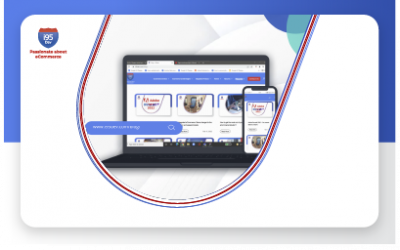Interfaced eCommerce solution VS
Integrated eCommerce solution

Interfaced eCommerce solution VS Integrated eCommerce solution
If you research, you will come across two major kinds of eCommerce solutions – interfaced and integrated. In layman terms, interfaced solutions operate outside of your ERP system; on the other hand, integrated solutions operate from within your ERP system.
To help you understand the difference better, here is a detailed comparison between the two eCommerce solutions:
|
Serial no. |
Category |
Interfaced eCommerce solution |
Integrated eCommerce solution |
|
1. |
Definition |
An interfaced eCommerce solution operates outside of your ERP. It synchronises and replicates data through complex connections. It requires a connector to sync data to the frontend online store from the ERP system. In addition, this kind of setup often requires additional bolt-ons such as a CMS. |
An integrated eCommerce solution directly connects the ERP system to your eCommerce store without the intervention of a third-party connector. The integrated eCommerce solution is partially installed inside the ERP system. It functions in a simple and seamless manner unlike other complex integrated solutions. |
|
2. |
Data transfer ease and speed |
The information in the online store database has to be synchronized with the ERP system. It isn’t automated. In the absence of a centralised database, an interfaced setup often requires mapping or matching codes for information exchange. If any modifications are done in either frontend or ERP, you may have to update the mappings table as well. If you fail to do so, the software might pull information from the wrong places. Interfaced eCommerce solutions take care of orders, discounts, customer details, sales tax and product information, in their own database. In an interfaced setup, data cannot be synced in real-time. However, you may have the option of choosing the frequency of data sync.
|
Integrated solutions share the same database. Therefore, mapping codes between systems is not needed. This minimizes errors and avoids data duplication. If any changes are made, it automatically updates across all the systems. In an integrated eCommerce solution, data from your company, stock control, finance, and distribution systems are automatically shared in real-time. It improves efficiency and enables customer self-service anytime, anywhere. |
|
3. |
Working with other systems |
Interfaced eCommerce solutions are flexible and easily fit into business needs and processes without demanding major changes in the systems. |
In case of integrated eCommerce solutions, the database levels need to be taken care of. Albeit, the process is lengthy and burdensome, it hides long-term benefits. |
|
4. |
Initial cost |
Many of the features such as multiple shipping addresses and bulk ordering are not available in interfaced eCommerce solutions. In other words, you have to custom build them from scratch. The cost of such a long period of experimentation totally depends on time spent and resources used. Thus, having an accurate estimation beforehand is not possible. In addition, it is time-consuming and expensive. |
Since an integrated online store is installed inside your ERP, the ERP provider is involved in setting it up. This proves to be beneficial because your ERP provider knows your business inside out and has already mapped out the processes and functionalities. An integrated eCommerce solution is installed on a fixed basis. In simpler terms, you are well aware of your initial cost and return on investment. |
|
5. |
Business efficiency |
In an interfaced eCommerce solution, each and every business process is separate. You have to coordinate updates resulting in additional costs and time investment. |
With an integrated eCommerce solution, you can extend your business reach across different countries by setting up pricing for different currencies and managing and marketing every region distinctly. In addition, it enables you to create and manage different product lines with exclusive branding while monitoring overall performance. |
|
6. |
Operational efficiency |
Interfaced software requires you to maintain two systems. A traditional interfaced online store executes price calculations of your ERP independently. For instance, the discounting and catalogue structure have to be maintained in your online store. In simpler terms, all the business specifics created in the ERP system have to be created again in your web store. To operate smoothly, such a system demands double work, takes double the time, and requires double the amount of investment. |
Once installed, all the business information is processed in a singular place – your ERP system. For instance, the moment a customer places an order on your web store, it reflects in the ERP. No synchronisation is required. It enhances operational efficiency, reduces overall cost, increases ROI, and helps you offer excellent service. While these features are time-consuming and complex in an interfaced situation, they are simple and fast in an integrated eCommerce solution. |
Interfaced or integrated: Which one is better?
Who wins the battle between interfaced and integrated eCommerce solutions is a difficult question to answer. In actuality, it depends on your existing systems, business requirements and the tools available to share data. For instance, if you want information to be centralized in one solution with real-time reporting and updating information, an integrated eCommerce solution is apt for your enterprise.
If you are looking for an integrated eCommerce solution that holds the key to delivery in today’s highly competitive digital environment, i95Dev’s EGE solution is perfect for you!
EGE is a feature rich multi-channel integrated eCommerce solution, powered by Magento, for Microsoft Dynamics and SAP ERP systems. The solution helps retailers, manufacturers, and distributors drive sales and establish themselves as a global brand.
Confused about which integrated eCommerce solution to go with?
i95Dev’s eCommerce Growth Engine is a feature rich multi-channel integrated eCommerce solution, powered by Magento, for Microsoft Dynamics and SAP ERP systems. The solution helps retailers, manufacturers, and distributors drive sales and establish themselves as a global brand; paying not just for itself but for their ERP systems as well.
Contact us now, drop a quick email at info@i95dev.com to reach our eCommerce experts or call us at 301.760.7499.
Recent Blogs
Enhancing Shipping Precision with Custom Shipping Groups in Adobe Commerce/ Magento
Enhancing Shipping Precision with Custom Shipping Groups in Adobe Commerce/ Magento Author Category Share Three things matter the most when it comes to eCommerce shipping: speed, accuracy,...
Managing Massive Product Catalogs: Why Synchronization is the Key to Efficiency
Managing Massive Product Catalogs: Why Synchronization is the Key to Efficiency Author Category Share The automotive aftermarket industry is vast and highly competitive, requiring businesses...
A Complete Guide to Seamlessly Integrating Adobe Commerce with NetSuite
A Complete Guide to Seamlessly Integrating Adobe Commerce with NetSuite Author Category Share Integrating Adobe Commerce (formerly Magento) with NetSuite ERP can transform the way businesses...



